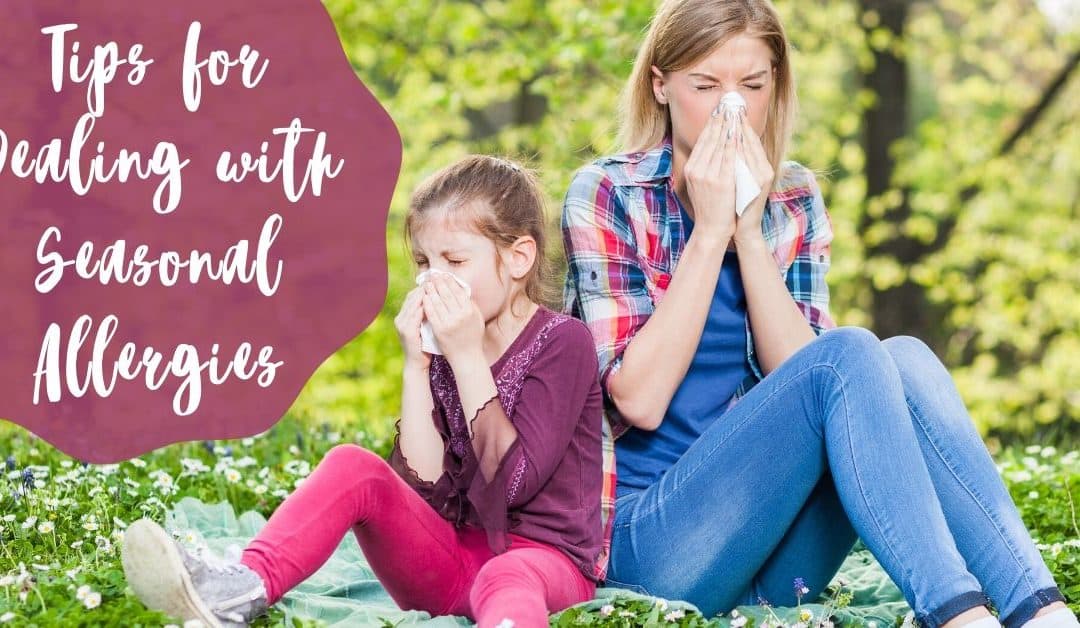Many of us look forward to this time of year: sunshine, blue skies, blossoming flowers, and growing plants. Though all of these signs of summer approaching bring much excitement, it also marks the beginnings of a yearly battle with allergies! According to the American Academy of Allergy, Asthma & Immunology, nearly 10% of the population experiences seasonal allergies. Itchy and watery eyes, runny or stuffy nose, and scratchy throat can be so constant and severe that it disrupts the flow of your day. Though you cannot stop seasonal allergies, there are numerous ways you can effectively treat and minimize these symptoms!
Causes of Seasonal Allergies
Also known as allergic rhinitis and hay fever, seasonal allergies occur at specific times of the year. Flowers, grass, trees, and weeds release their specific pollens – a powder like substance produced by plants to fertilize other plants – at various times during the year. Different types of pollen are more prevalent at specific times:
- January through April: pollen released from trees such as pine, ash, poplar, and elm are pervasive
- Summer months: pollens from grass are dominant
- Fall: pollen from weeds is more prevalent
Though it is possible to experience seasonal allergies year-round, it is far less common during the winter. One’s experience with seasonal allergies depends on specific allergens, where you live, and time of year. The most common trigger of seasonal allergies is pollen produced by wind-pollinated plants (trees, grass, weeds) rather than insect pollinated plants. Drier days during spring and summer months allows pollen to remain in the environment for a longer period of time, activating allergies more intensely.
What is physiologically happening? The body’s immune system reacts to the allergen (most commonly pollen) like it is a threat and produces antibodies to fight it. As the body comes into contact with the allergen – the wind helps spread pollen which can easily land on one’s skin, hair, or be inhaled when outside – more antibodies are produced as well as histamine and chemical mediators. These chemicals create the allergic reaction that results in the typical symptoms people experience: runny nose, itchy eyes, sneezing, congestion, itchy nose etc.
Treatment
Though seasonal allergies can be effectively treated, there are no cures. Symptoms are most commonly managed by numerous types of over the counter medications. There are many types of nonprescription medications that are used including the following:
- Antihistamines: taken orally, antihistamines are used to alleviate the most common symptoms of allergies (Claritin, Zyrtec, Allegra, etc.)
- Decongestants: specifically relieve nasal congestion and can be taken either orally or via nasal spray.
- Nasal Spray: alleviates stuffiness in the nose.
There are also medications that combine antihistamines with decongestants. In addition to oral and spray solutions, people use natural remedies which include:
- Rinsing nasal pathways with saline solution to reduce congestion with a neti pot or squeeze bottle. This clears the mucus and allergens in your nasal passages.
- Acupuncture: an ancient practice grounded in traditional Chinese medicine that involves inserting thin needles into the body to alleviate pain.
- Steaming: steam from a machine or humidifier can clear buildup of mucus that causes congestion.
- Ingesting raw honey to alleviate irritation of the throat. Honey is often mixed into tea or hot water.
Tips
There are numerous ways that you can deal with seasonal allergies. In addition to taking the kind of medication that works best for you, here are a few tips to practice:
-
- Be aware of the pollen count! Allergies are intensified when there is a lot of pollen in the air. To know current and upcoming levels of pollen, check the news of the internet. If pollen is projected, start taking any medications prior to experiencing symptoms.
- Keep any windows and doors closed when pollen is high.
- Avoid being outside: in the morning when pollen tends to be the most prevalent and on windy days (wind spreads pollen).
- Limit activities outdoors such as gardening, mowing the lawn, exercising etc.
- Remove clothes worn outside when returning to your home
- Keep the air indoors as clean as possible by vacuuming frequently, using a dehumidifier, regularly replace air conditioning filters etc.
Finding the right combination of nonprescription medications and/or natural remedies in addition to taking precautions can significantly ease the symptoms of seasonal allergies! Contact us today to learn more.

